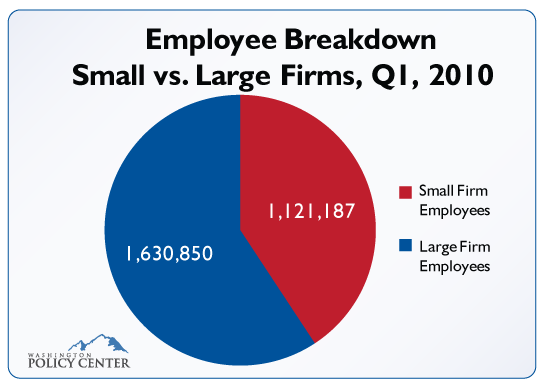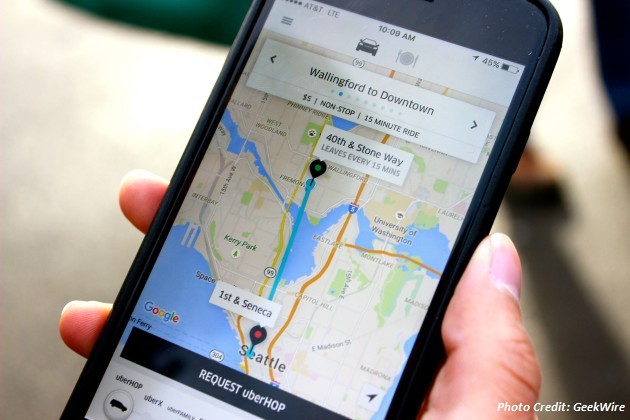What is a Small Business?
The state of Washington defines a “small business” as any business entity, including a sole proprietorship, corporation, partnership, or other legal entity, that is owned and operated independently from all other businesses, and has fewer than fifty employees.
How Important are Small Businesses to Washington’s Economy? Small Businesses:
- Represent 96.2% of all registered businesses in Washington.
- Employ 41% of all private sector employees.
- Paid almost $800 million in B&O taxes in 2009.
- Firms with fewer than 20 employees pay $18 billion in payroll to their employees, or 16% of total state payroll.
How Many Small Businesses are There in Washington?
In the first quarter of 2010, there were 217,493 registered businesses in Washington that have fewer than 50 employees. There were 8,496 registered businesses with 50 or more employees.
What is Small Business’ Share of Employment in Washington?
Small businesses in Washington employ 41% of the state’s non-government workforce. In the first quarter of 2010, businesses with fewer than 50 employees employed just over 1.1 million private-sector workers.

Business Starts and Closures
According to the latest data available, Washington ranks 3rd in business starts and 2nd in business terminations (2006).
Washington ranked 5th in business starts in 2005 and 3rd in 2004. The state ranked 1st in business closures in 2005 and 1st in 2004.
The U.S. Small Business Administration (SBA), which defines small businesses as having fewer than 500 employees, estimates show that seven out of 10 new businesses survive at least two years, half at least five years, a third at least 10 years, and a quarter stay in business for 15 years or more. Conversely, this means that one out of two businesses fail within its first five years. The data are generally consistent across industries and states.
Washington’s business churn rate is 3rd highest in the nation, meaning the state has a high rate of businesses starts and closures. This does not always indicate trouble, however, as high business turnover often results in a reallocation of resources towards economic growth. Previously, Washington ranked 2nd in churn in 2005 and 1st in 2004.
Washington State Private Sector Business Starts and Closures | |||||
| 2005 | 2006 | 2007 | 2008 | 2009 (Q1) |
Starts | 18,333 | 18,609 | 18,590 | 17,601 | 3,734 |
Closures | 15,837 | 15,766 | 17,431 | 19,996 | 5,163 |
Regulatory Impact
The impact of regulatory compliance costs on small businesses is disproportionately high. A recent SBA study points out that very small firms (fewer than 20 employees) will spend four and a half times as much per employee to comply with environmental regulations, and three times more per employee on tax compliance, than their larger counterparts.
In 2009, Washington state agencies proposed over 14,000 pages of regulations. The final result was over 6,000 new pages in order to accommodate 545 new or amended regulations.
Costs and Availability of Health Insurance
An Employment Security Department survey shows that smaller businesses are less likely to offer health insurance to employees. Forty-five percent of firms with between two and nine employees offer health insurance, while 68% of firms with 10 to 24 employees offer it. Eighty-two percent of firms with 25 to 49 employees offer health insurance, while 90% of firms up to 99 employees, 95% of firms between 100 and 499 and 96% with more than 500 employees offer it.
Tax Rates & Tax Exemptions
Washington small businesses pay various business taxes — primarily the Business and Occupation tax (B&O), which taxes gross receipts and does not allow any deductions. Only a few other states have a gross receipts tax, and none relies on it as heavily as Washington. Rates range from 1.8% for service industries to 0.484% for manufacturing, 0.471% for retail and various rates for other specific industries.
The current small business tax credit ranges from $70 per month for service-oriented businesses to $35 a month for all other categories. The tax credit means small businesses in the service category grossing less than $46,722 do not pay B&O tax. Small businesses in manufacturing or wholesaling that gross less than $173,760 do not pay B&O tax and neither do small businesses in the retail industry that gross less than $178,556. Other various tax credits or exemptions are available depending on industry classification.
More Information
- Doing business in Washington: access.wa.gov/business/
- Washington State Department of Commerce: commerce.wa.gov
- Governor’s Office of Regulatory Assistance: ora.wa.gov
- Washington Policy Center: washingtonpolicy.org/research/business-climate/new
Read or download a pdf of this report here.
To sign up for Washington Policy Center’s Small Business email Update newsletter, click here, call 206.937.9691 or email cgipson@washingtonpolicy.org.




